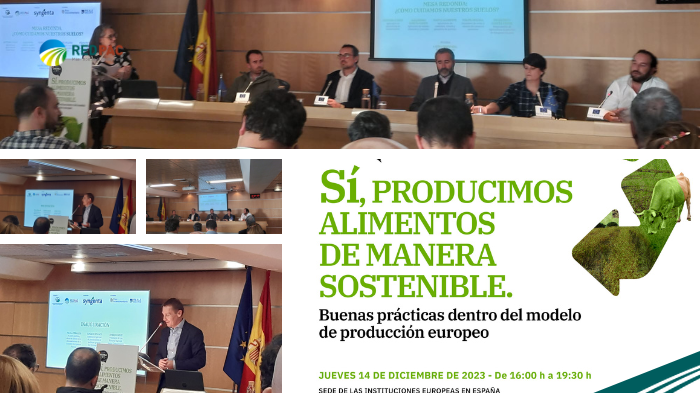
18 de December de 2023
Cambio climático y gestión de recursos naturales
Farmers and ranchers from different parts of Spain attended the event and detailed the environmentally friendly practices they apply on their farms.
- The PAC Network, together with Editorial Agrícola, co-organized a coffee day entitled "Yes, we produce food sustainably. Good practices within the European production model."
- Farmers and ranchers from different parts of Spain attended the event and detailed the environmentally friendly practices they apply on their farms.
"When we talk about sustainability in agriculture, we make the mistake of focusing on the environmental aspect and ignoring other pillars that support it." This was how Francisco García Verde of Syngenta expressed himself at the agricultural coffee conference held on December 14th under the title "Yes, we produce food sustainably. Good practices within the European production model." The conference was attended by prominent farmers and ranchers who practice various production techniques on their farms that are respectful of the soil and the environment, all within the framework of the new CAP .
The day featured two roundtable discussions, one on soil care and the other on optimizing production resources. Both were facilitated by experts in the sector, and the event was opened and closed at the institutional level by the Ministry of Agriculture, Fisheries, and Food (MAPA), along with other organizations that collaborated in the organization.
How do we take care of our soils?
The first roundtable discussion, "How do we care for our soils?" moderated by Laura Cristóbal, director of Efeagro , featured contributions from Antonio Conde (a farmer specializing in soil conservation), Alejandro García Gaseo (a vineyard, almond, and pistachio farmer), Marta Llorente (a camelina farmer, a vineyard farmer, and a pig farmer), Felipe Molina (an extensive cattle and sheep farmer), and Francisco García Verde (Head of Sustainable Agriculture at Syngenta Spain). As Antonio Conde stated, "sustainability policies are all benefits for us," hence his effort to make a point: "We must convey to young people the importance and necessity of our profession. Agricultural engineers are needed to work in the fields."
Alejandro García Gaseo expressed his support for the new digital agricultural logbook to demonstrate the good work done by farmers, and emphasized that there must be a balance between sustainability and profitability: "without the latter, the former cannot exist." Marta Llorente was more critical: "Not all areas are the same economically speaking: plant cover works, but not in all areas. In mine, they can freeze over in the snow and take the crops away."
For Felipe Molina, "the ecosystem services provided to society by extensive livestock farming far outweigh the cost of what society pays for it. Somehow, society should be aware of the work we do and should be better compensated for it."
How do we optimize the means of production?
The second roundtable discussion - How do we optimize the means of production?, moderated by Jesús López, director of Grupo Editorial Agrícola Henar Comunicación - featured interventions by Antonio Torres (cereal, rapeseed and lentil farmer), Clara Benito (extensive goat farmer), Nando Durá (citrus and rice farmer) and Pilar Giménez (director of Regulatory Affairs at Syngenta).
Antonio Torres advocates adapting farms to new technologies gradually, "so that farmers aren't overwhelmed." Clara Benito advocates bringing farm work closer to the people by inviting them to visit farms and ranches: "You learn by teaching and sharing."
For his part, Nando Dura affirms that sustainability is always the result of planning, not chance: "To be sustainable, you have to optimize your own time and resources, which each person has available."
Regarding words they would use to describe the future of sustainability, participants floated the following concepts: "synchronization," "synergies," "innovation," "regeneration," and "profitability."
At the closing ceremony, Ignacio Atance, deputy director general of agricultural policy planning at MAPA, emphasized that "the food of the future will depend on how we manage our soils and the impact of inputs on them."
If you would like to view the recording of the session, you can view it here .









